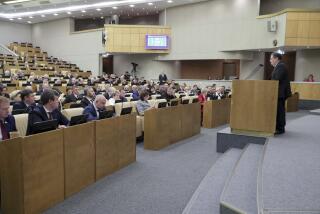Going Broke in Moscow
- Share via
The Soviet Union’s new candor has prompted the public admission that the government not only runs a budget deficit, but that it’s a whopper. Three months ago Finance Minister Boris Gostev disclosed that the 1989 deficit would reach 35 billion rubles, or $58 billion at the official rate of exchange. Western economists who considered that figure too low now find their suspicions confirmed. Leonid I. Abalkin, director of the National Institute of the Economy, says that this year’s real deficit, including borrowing, will exceed $160 billion. That’s equivalent to 11% of the gross national product, compared to a U.S. budget deficit thatis about 4% of GNP. The deficit, Abalkin says, “ruins” the economy. For President Mikhail S. Gorbachev it also raises the most troubling political questions.
For one thing, Abalkin says, trying to reduce the deficit will force deferring until at least the mid-1990s the major improvement in living standards that Gorbachev has made a priority in his program to restructure the economy. So far, whatever has been promised, the Gorbachev era has seen a net decline in living standards, with short-ages of food and basic consumer goods deepening even as public demands for improvement grow louder. As part of the effort to cut the deficit, Abalkin says, about 20% of current capital investment in the civilian sector will be slashed. The prospect, then, is for things to get worse before they start to get better.
Other savings are expected from previously announced cuts in military spending and from a threatened shutdown of inefficient, money-losing factories and farms. These steps could cut the deficit by about 20%. But far more drastic measures will have to be taken if the hoped-for goal of wiping out the deficit within three years is to be reached.
A further casualty of the deficit crisis will be the plan to lift government controls on prices. As Abalkin concedes, price deregulation in a time of unabated shortages would be sure to produce an inflation that in turn would raise demands on the state for higher wages, further aggravating the deficit problem. But if moving toward a market system of prices is deferred, then it’s hard to see how plans to edge toward a market system in the production of goods can be carried out. Soviet economic history makes clear that the gap between consumer demand and supply can’t be closed by fiat or ideological exhortation. A market approach would narrow that gap, but now the Soviet Union’s most prominent economist says that the conditions for this aren’t appropriate and are not likely to be for some time.
Gorbachev has staked his political life on making economic restructuring work. If the reform effort fails, as he well knows, the Soviet Union can forget about its chances to be internationally competitive. So far success has eluded him, and the unavoidable question becomes how much more time he may have left to shake up a system that has proved to be woefully inadequate for the late 20th Century, and hopelessly unsuited for the 21st.
Gorbachev’s high standing in opinion polls taken in West Germany or Orange County is interesting, but far more significant is how he stands among 285 million Soviet citizens. The priority that he gave to improving supplies of food and consumer goods showed clearly the importance that he put on winning public approval, for popular support could give him a claim to political legitimacy that his opponents in the higher echelons of leadership would fear to challenge. Now, though, the Soviet people are again being told that their economy is a mess and that they will have to wait still longer for the promised bigger piece of the pie. That message is not likely to boost Gorbachev’s approval rating at home, or strengthen his hand in the Kremlin.
More to Read
Sign up for Essential California
The most important California stories and recommendations in your inbox every morning.
You may occasionally receive promotional content from the Los Angeles Times.













